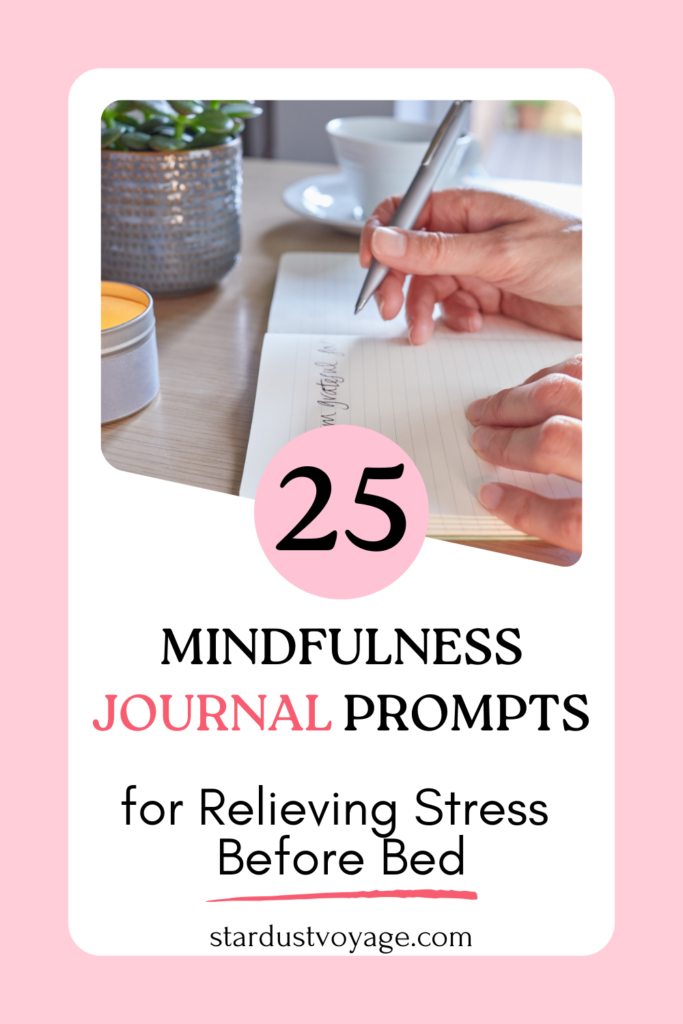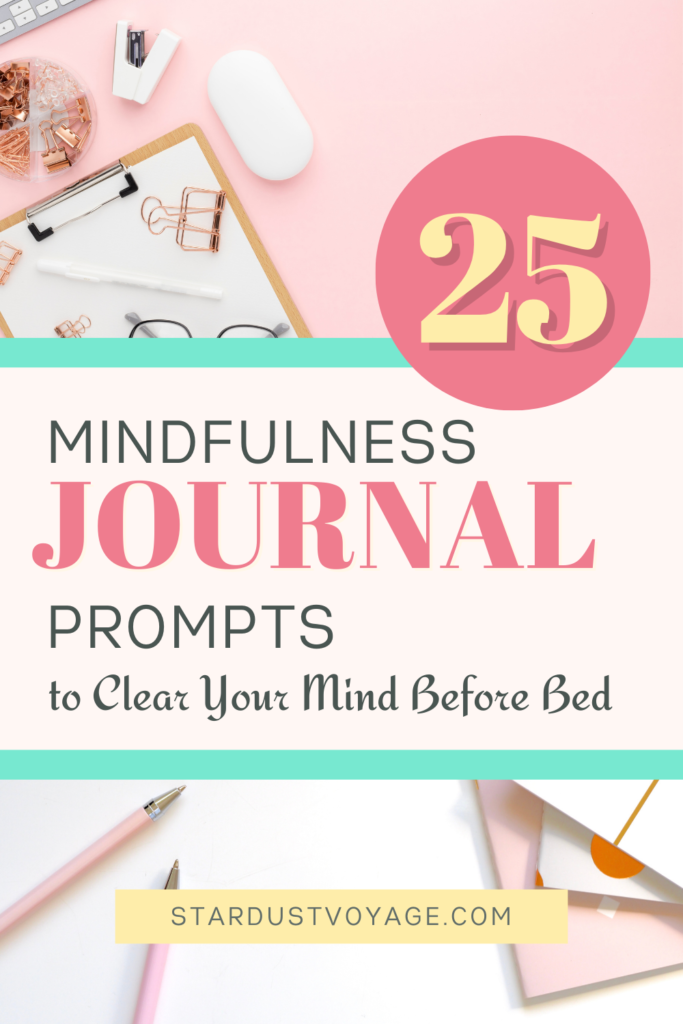Imagine this: you’re snuggled in your cozy bed, ready to drift off to sleep, but your mind is racing with the day’s events and worries about tomorrow. Sound familiar? If so, you’re not alone. Many of us struggle with stress and anxiety before bed, making it difficult to get a good night’s sleep. But there’s a simple and effective way to calm your mind and prepare for restful slumber—mindfulness journaling. Let’s dive into how this powerful practice can help you unwind and explore 25 journal prompts specifically designed to relieve stress before bed.

The Power of Mindfulness Journaling
Mindfulness journaling is more than just writing down your thoughts. It’s a therapeutic practice that helps you stay present, process your emotions, and gain clarity. By focusing on the here and now, you can let go of the stressors that plague your mind, making way for peace and relaxation. Research shows that journaling can significantly reduce stress and anxiety, improve mood, and enhance overall well-being.
Understanding Mindfulness Journaling
Mindfulness journaling combines the reflective nature of journaling with the calming effects of mindfulness. This practice involves writing with intention and awareness, without judgment. It’s about exploring your thoughts and feelings, understanding them, and finding a sense of calm amidst the chaos. Now, let’s explore how you can incorporate this practice into your bedtime routine with specific prompts.
Setting the Scene for Bedtime Journaling
Before we jump into the prompts, creating the right environment is essential. Find a quiet, comfortable space where you can write without interruptions. Dim the lights, light a calming candle, and maybe play some soft music or nature sounds. Use a journal and pen that you love—this makes the experience more inviting and enjoyable.
25 Mindfulness Journal Prompts for Bedtime
Reflecting on Your Day
1. What was the best part of your day today?
Reflecting on positive moments can boost your mood and help you focus on the good before bed.
2. What was the most challenging part of your day?
Acknowledging challenges can help you process any lingering stress or frustration.
3. What are three things you’re grateful for today?
Gratitude journaling shifts your focus from stress to appreciation, fostering a positive mindset.
4. Describe a moment today when you felt truly present.
Recalling moments of mindfulness can reinforce the habit and bring a sense of peace.
5. How did you take care of yourself today?
Reflecting on self-care activities reminds you of the importance of prioritizing your well-being.
Exploring Emotions
6. What emotions are you experiencing right now?
Identifying and naming your emotions can reduce their intensity and bring clarity.
7. Write about a time today when you felt overwhelmed. How did you handle it?
Reflecting on coping mechanisms can help you understand what works and what doesn’t.
8. What is one thing you’re proud of today?
Celebrating small victories can enhance your self-esteem and end your day on a positive note.
9. How can you show more compassion to yourself?
Self-compassion is crucial for managing stress and fostering a kind inner dialogue.
10. What is a recurring thought you’ve had today? How can you reframe it positively?
Challenging negative thoughts and reframing them can reduce stress and promote a healthier mindset.

Planning for Tomorrow
11. What is something you’re looking forward to tomorrow?
Anticipating positive events can make you feel more optimistic about the day ahead.
12. What are your top three priorities for tomorrow?
Setting priorities helps you feel organized and less overwhelmed.
13. How can you make tomorrow better than today?
Reflecting on improvements fosters a proactive and positive attitude.
14. What’s one goal you want to achieve tomorrow?
Focusing on a specific goal can provide direction and motivation.
15. What is something you want to let go of before you sleep?
Releasing worries or negative thoughts can help you relax and prepare for sleep.
Cultivating Positivity
16. Write down three positive affirmations for tomorrow.
Positive affirmations can set a hopeful and encouraging tone for the next day.
17. Describe a happy memory from today.
Recalling joyful moments can end your day on a high note and promote restful sleep.
18. What is something kind you did for someone today?
Reflecting on acts of kindness boosts your mood and reinforces positive behavior.
19. How did someone make you feel appreciated today?
Recognizing appreciation from others can strengthen your sense of connection and happiness.
20. What is one thing you’re proud of yourself for handling well today?
Acknowledging your strengths and achievements can boost self-confidence.
Reflecting on Growth
21. What did you learn about yourself today?
Self-discovery is a continuous process, and daily reflection helps you grow.
22. How did you grow or improve today?
Focusing on personal growth highlights your progress and motivates you to keep evolving.
23. What is a new insight you gained today?
New insights can offer fresh perspectives and enhance your understanding of yourself.
24. What is a habit you want to develop or break?
Identifying habits helps you focus on personal development.
25. What is one thing you’re grateful for about yourself?
Self-gratitude fosters a healthy self-image and self-love.

Tips for Maintaining a Bedtime Journaling Routine
Starting and maintaining a bedtime journaling routine can be challenging, but these tips can help you stay consistent and reap the benefits.
Create a Relaxing Environment
Set the stage for relaxation by creating a cozy and calming space. Dim the lights, light a scented candle, and play soft music. A comfortable environment makes journaling more enjoyable and effective.
Use a Comfortable Journal and Pen
Choose a journal that feels good to write in and a pen that flows smoothly. The tactile experience of writing can enhance the therapeutic effects of journaling.
Be Consistent
Try to journal at the same time every night. Consistency helps establish a routine, making journaling a regular part of your bedtime ritual.
Be Honest and Vulnerable
Use your journal as a safe space to express your true thoughts and feelings. Honesty in journaling leads to deeper insights and more effective stress relief.
Reflect on Your Entries
Take a moment to review your entries periodically. Reflecting on your journal can help you identify patterns, track your progress, and gain a deeper understanding of yourself.
Conclusion: Your Path to Stress Relief
Mindfulness journaling before bed is a powerful tool for relieving stress and enhancing your overall well-being. By incorporating these 25 prompts into your nightly routine, you can cultivate a habit of self-reflection, gratitude, and mindfulness. Remember, the key to effective journaling is consistency and honesty. So, grab your favorite journal, find a cozy spot, and start writing your way to a calmer, more peaceful mind.
Journaling is a deeply personal practice, and there’s no right or wrong way to do it. Experiment with different prompts and techniques to find what works best for you. With time and dedication, you’ll discover that bedtime journaling can transform your stress levels and improve your sleep quality, leading to a healthier, happier life.
Sweet dreams and happy journaling!









